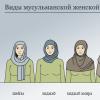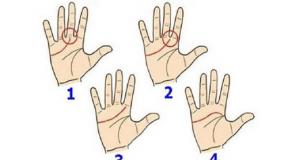Bachelor's degree or not. A bachelor's degree is higher education or not. What is the difference between a bachelor and a specialist
Back in 1997, Russia joined the single European educational space. This happened after the signing of the Bologna Convention, which involves the transition to the so-called two-level educational system. Starting this year, all universities in the country offer bachelor's and master's programs of study and training of specialists to future students. At the first level there is a bachelor's degree and its "basic" knowledge, at the second level a master's degree and a specialist. What is the difference between these levels of education?
Definition of degrees of education
Modern students after graduation from school (or technical school) have a very difficult time. Not only are they often required to decide on future profession"here and now" and pass the appropriate number of exams, so there is some confusion with educational programs. Someone shouts that a bachelor's degree is an unfinished higher education and it is imperative to complete a master's degree, someone claims that a specialty as a training program has long been excluded, someone does not understand all these educational levels at all and carries his cherished documents with his eyes closed to the first university you come across.
In order to prevent this from happening to you, let's try to figure out what is the difference between these mysterious educational levels.
Undergraduate
Initially, the academic cap was intended for undergraduates, but then bachelors began to use it as well.
Let's start with the simplest (and for some the most difficult) - with a bachelor's degree. Bachelor's degree is the initial stage of higher education. Bachelor's degree is full-fledged higher education with all the ensuing consequences.
Bachelors degree:
- the degree (qualification) of the bachelor confirms the receipt of higher professional education;
- the program is designed for four years of study;
- upon graduation, the student must pass the final certification (pass state exams) and / or defend a diploma;
- after completing the undergraduate studies, the student has the right to enter the master's program.
Now let's look at all the provisions in more detail.
Graduates of schools, colleges, technical schools and colleges can apply for a bachelor's degree. Of course, for this you need to pass the relevant USE exams (they will depend on the specialty that you would like to get).
A bachelor's degree means that a university graduate has completed four years of study and received a basic higher education. Employers around the world understand this statement because the undergraduate degree is part of a two-tier European education.
After graduation, a student applying for a bachelor's degree must pass a final certification and / or defend a graduation qualifying work(popularly "diploma"). Having adopted European standards of education, Russia did not trouble itself with rewriting educational programs and revising the certification of future university graduates. In fact, many students are now studying in the same programs that were successfully operating until 1997 and were designed for 5 years of study.
This system does not work in all specialties. Some still assume only examination certification without any written confirmation.
For those who do not want to be limited to basic knowledge, a master's degree is provided. After completing a bachelor's degree, a graduate can, with a clear conscience, apply to a master's program. Moreover, it is not necessary to choose a master's degree in your own specialty, you can choose something completely different and end up with two different specialties.
Let's highlight the advantages and disadvantages of a bachelor's degree.
- short period of study;
- the degree gives the right to employment both in Russia and abroad;
- the degree gives the right to continue education;
- after a bachelor's degree, it is possible to enter a master's program even in another university and in another specialty.
- low demand for bachelors among leading employers in the Russian Federation (the whole point here is confusion due to the simultaneous existence of bachelor's and specialist's degrees in our country, because of this, many employers think that a bachelor has a more limited set of knowledge than a specialist, although this the same curriculum)
- a limited number of state-funded places in the master's program (due to the transition to a two-level education system, the number of free places in the master's program was significantly reduced, and the competition was tightened).
Many people also mistakenly think that the level of knowledge and the rigidity of the requirements at the bachelor's degree is much lower than at the specialist's and master's programs. Most often this is not the case. It depends on the university in which you are going to study, on the specialty you have chosen, as well as on teaching staff educational institution.
Master's degree
A master's degree is an obvious plus on a resume
People who have a bachelor's or specialist's degree can go to the magistracy.
Obtaining a master's degree involves six years of study at a university. These six years include undergraduate studies (four years) and directly the master's program of study (two years). It is assumed that this degree is chosen by those students who plan to continue their scientific activities.
Education in the magistracy involves a narrower educational focus. If the bachelor's degree is considered the basic level of education, studying at which students receive general (initial) knowledge about the specialty, then the master's degree is designed for a more conscious attitude to the subject of study (the student must clearly know what he is interested in and direct his efforts to a deeper study of the subject of scientific research).
During two years of study in the magistracy, the undergraduate student is obliged to work on a master's thesis. Upon graduation, he will have to defend his master's degree, which will allow him to receive a “crust” corresponding to his scientific degree.
Let's highlight the advantages and disadvantages of obtaining a master's degree.
- After graduating from a bachelor's degree, it is not necessary to immediately enter a master's program. You have time to relax a little and think about your future;
- master's degree allows you to dramatically change your specialty. If, for example, you have a bachelor's degree in one specialty, but you have always dreamed of another, then a master's degree is a great tool to fulfill your dream;
- A bachelor's degree and a master's degree can be obtained at different universities. And this applies not only to domestic educational institutions. You can enroll in a master's program abroad.
- tougher competition for budget places. In connection with the transition to a two-level education system, the competition for budget places has become much tougher, students are selected according to certain criteria and merits;
- employment problem. If you are a poor student who has financial problems, then know that you can only get a job that is combined with study schedule. The modern dominance of students who want to study and work (read “enroll at the university, but not attend it”) is very large, therefore, for absenteeism, even because you are busy at work, you can easily be expelled and find a replacement for you on the same day;
- short learning period. This is not about the fact that those who are thirsty for knowledge are given a small amount of time to obtain this knowledge, but about the fact that in two years you have to write a rather voluminous scientific work. If you have not encountered this at the undergraduate level (did not defend your diploma, but only passed state exams), then it will be very difficult for you to adapt to this certification format in such a short time. Especially if you work and study at the same time.
Specialty
In many CIS countries, the specialty has already been canceled
Let's move on to the most incomprehensible educational course - the specialty. This direction is a dying stage of higher education, because after the transition to the European system in our country (for some reason) they did not want to abandon this format of higher education.
These days it's hard enough to find an institution that allows students to choose a major as their program of study, but some universities (especially in the provinces) provide such an opportunity, which causes even more confusion among already frightened would-be students.
The qualification of a specialist is also a higher professional education. The confusion begins at the moment of the final certification. Here, many people begin to confuse bachelor's and specialist's degrees, and comparing them, they find that studying at a bachelor's degree takes only four years, and five years at a specialist's (provided that everything else for these qualifications is the same). Such a discovery makes many people think that a bachelor's degree is an incomplete higher education, while a specialist's degree is full and complete.
Let's dispel the myths: both the bachelor's degree and the qualification of a specialist are higher professional education. The only problem is that in Russia they did not bother to rework the curricula and the certification system for university graduates, so they left everything as it was and added a two-level education system to this.
Ideally, we should not have a specialty at all, students should immediately enroll in a bachelor's degree, and then, if they wish, continue their studies in a master's and postgraduate studies. At the same time, future bachelors must pass only state exams at the end of their studies (without protection of scientific work).
In reality, we still have two almost identical stages of higher education, one of which was simply taken away from one year of study (which, by the way, is most often not “scattered” in terms of the curriculum for the remaining 4 years, but included in Last year). Therefore, bachelor students are required to master everything that specialist students master in four years and during this time manage to write a qualifying scientific work and prepare for state exams.
The only significant advantage and difference between a specialty and a bachelor's degree is the fact that after completing a specialist's degree, a student can immediately apply to graduate school. This is very convenient for those who intend to build a scientific career.
Consider the advantages and disadvantages of the specialty.
- advantage when applying for a job within the Russian Federation. The new system of higher education has not yet been fully adopted in Russia, so many employers believe that a specialist degree is a full-fledged higher education, while a bachelor's degree is incomplete or insufficient;
- opportunity to go directly to graduate school. The good news for those who are going to connect their lives with science is that obtaining a specialist qualification will allow you to immediately enter graduate school;
- magistracy is considered the second higher education. For those who want to learn something new, the specialty will also be very convenient - after completing the specialty, you can enroll in a master's program in another specialty. Upon completion of the master's program, you will be considered the owner of two higher educations.
- a specialist diploma is not quoted abroad. Foreign employers do not know who a specialist is and what he eats with. They are accustomed to a two-tier education system, and something similar to a bachelor's degree, but at the same time different from it in some criteria, does not suit them;
- many universities have already practically got rid of the specialty. Although the phenomenon of a specialist qualification still exists in our country, it is difficult to quickly find a university that provides the opportunity for a five-year study;
- a bachelor's degree and a specialist's degree are equated. This should have become clear even at the time of comparing bachelor's and specialist's degrees. These two levels provide one curriculum, the same certification, so that the diplomas here will be the same in terms of weight.
PhD
In some countries, graduate school is already considered a full-time job, not a study.
Postgraduate study is the first step on the way to a scientific career. It is not a mandatory element in obtaining higher education and is considered as a separate educational block.
PhD degree (postgraduate student):
- the time of study in full-time postgraduate study is 3 years, in correspondence 4 years;
- upon completion of postgraduate studies, a postgraduate student is obliged to defend a dissertation, which will allow him to receive a Ph.D. degree;
- for the entire period of postgraduate studies, the future candidate of sciences must pass three candidate exams, as well as prepare several scientific publications;
- graduate school gives the right to conduct classes at universities, as well as take exams;
- After completing the postgraduate studies, you can enter the doctoral program.
Postgraduate study provides for the student's desire to engage in scientific activities, as well as to teach in higher educational institutions.
What is the difference between Bachelor's, Specialist's, Master's and PhD
The difference can be seen in comparative table below.
Table: differences in educational levels
| Comparison points | Undergraduate | Specialty | Master's degree |
| Applicant Selection Criteria | Applicants with secondary general education | Bachelor's Degree/Specialist Qualification | |
| Studying time | 4 years | 5 years | 2 years |
| Degree (qualification) | Scientific degree (bachelor) | Professional qualification (specialist) | Scientific degree (Master) |
| Educational base | Basic training (no narrowly focused research is provided) | General training, which is aimed at obtaining practical knowledge in the chosen specialty | Deep learning specialization designed to continue scientific activity |
| Form of final certification | Passing the state exam and defending a diploma | Master's degree defense | |
| The next level of learning | Master's degree | Master's or PhD | PhD |
| Professional perspectives | Opportunity to apply for any position requiring higher education | ||
Summing up what has been said, I would like to note once again: despite the fact that the system of higher education in Russia is rather complicated, it is not so complicated. All three levels of the two-tier system of European education are full-fledged higher education. Bachelor's and specialist's degrees are almost identical levels, so they are very often confused or not distinguished. Both bachelor's and specialist's degrees are the first (basic) level of the higher education system. The specialty is almost completely excluded from the proposed options for obtaining higher education, its place is taken by the bachelor's degree.
Master's degree is the second optional stage of higher education and is designed for those students who want to study their specialty in more detail.
Postgraduate study, in turn, is the first stage of a research career. A student can enroll after completing the first two levels of higher education.
In the summer, many school graduates rush to apply to one or more selected universities to continue their studies and acquire their chosen profession.
Equal Diplomas
Not so long ago, Russian universities produced only specialists with diplomas. For example, a graduate of a technical university became an engineer, agronomist, economist with a prefix of a certain specialty. They wanted to change this scheme back in the 90s of the twentieth century and make it similar to the Western one. Europeans and Americans produce bachelors and masters in their universities.
This innovation was established so that the diplomas that students receive after graduating from a Russian higher education institution are recognized in other countries. So that the graduate does not have to retrain abroad or confirm his education in any way. Thanks to the similar duration of training and uniform titles, it becomes clear to any employer in the world what kind of education a job seeker has received.

Why a two-tier system?
To realize our plans, our country joined the Bologna Convention. This required the higher education sector to be brought up to the standards required by the participating countries. Today, the law on higher and postgraduate education establishes a two-level system of higher education: bachelor and master.
Why a two-tier model? The main reason lies in the fact that such a system of training specialists is better adapted to a market economy. This model has been used for a long time in the USA, Canada, England and other countries, and it is this model that has determined their economic success.
The term "bachelor"
Where does this word originate? What is a bachelor? FROM in English term is translated as:
- Young vassal knight.
- Lonely male.
- Bachelor.
If you think about it, it turns out that this is a young man looking for his place under the sun in this world. It is quite a suitable name for someone who is at the beginning of his life's journey.

The essence of the bachelor
What is a bachelor? This is a high school graduate. Today, many people who graduate from high school have a "bachelor" in their diploma. Is it higher education or not? A graduate receives a completed higher professional education, but, unlike a master's degree, at the basic level. The preparation of a bachelor takes four years, during which the student receives fundamental knowledge of a general scientific and general professional nature without a narrow specialization.
Fundamental training helps to more easily adapt to the ever-changing labor market, where it is necessary to master related professions. Now most employers are satisfied with the basic higher education of the applicant. The rest will be shown to him and told on the spot.
Study or work?
Many future graduates are concerned about the question: is a bachelor's degree a higher education or not? This is the first level of higher education. The student receives a bachelor's degree, then, without interruption in his studies, he can continue his studies at the institute and enroll in a master's program. And if he is tired of studying and wants to take a break? When a young person decides to take a break from studies, basic vocational training and a bachelor's degree will give him the right, on an equal basis with other university graduates, to apply for the corresponding position. After some time, when the experience is accumulated, he will be able to continue his studies in the magistracy of any university in our country or abroad more consciously.

The term "master"
Translated from Latin means "mentor", "teacher". Master's degree is the second level of higher education, it is focused, among other things, on teaching and research activities. To enter here, you must pass exams. Master's degree gives the opportunity to enter graduate school.
How many diplomas are obtained? After four years of study at the university, the student is issued a bachelor's degree, with which he has the right to enter the master's program, after two years of study he receives a diploma. It turns out that after 6 years of successful study, he has two diplomas in his hands.
Thus, answering the question of what a bachelor is, let's summarize: this is a young man (or girl) who has received basic knowledge in the chosen specialty and received a university diploma.
The transition period ended in 2011, and now all universities have switched to a two-level system of education "bachelor - master". Only military, medical and art higher educational institutions were not included in this list. The magistracy is mainly concentrated in state higher educational institutions, and the bachelor's degree is present in non-state ones. The list of directions of universities is very extensive. It depends on the name and direction of the educational institution itself.
So, we found out what a bachelor is. There are many different areas of study for this degree. For example, a bachelor of economics. Having received such a diploma, a young person will be able to work in organizations of various industries and forms of ownership, carrying out economic, marketing, analytical, financial, production and economic services. Also, upon graduation, he is awarded a bachelor's degree or, in other words, a qualification.

From the history
In the pre-revolutionary period of Russian history, the title of "master" was introduced by Alexander I in 1803. The master occupied an intermediate value between the candidate (this is a person who graduated from the university with honors) and the doctor. The master's degree made it possible to obtain the rank of titular adviser.
Only the following universities could give academic degrees: Moscow, Derpt, Kazan, Kharkov. The degree was awarded after the student passed the master's exam. Preparation for it took about 4 years. The pre-revolutionary master can be approximately equated with the current candidate of sciences. The requirements for obtaining a master's degree were comparable and comparable to the Ph.D. of Europe at that time. At the end of the 19th century, in most Russian universities, the candidate's degree was abolished and the "master-doctor" model began to exist. After the revolution, all scientific degrees were liquidated in Russia, and they did not exist until 1934.
Bologna Declaration
European education ministers signed a joint statement in Bologna in 1999. The declaration speaks of the creation of a single area of European higher education and the intention of the countries that signed it to promote the European HE system around the world. Our country joined this movement in 2003, it became the 40th one to sign it.

Naturally, there are also opponents of the pro-Western education system. Not without reason, it is believed that the Russian model of education in a number of areas of training is not only not inferior to the Western one, but even surpasses it. Therefore, the unification of education will not have a positive impact on its improvement. There is also an opinion that the equivalence of diplomas will push graduates to leave the country. The imperfect base of many universities will not give them the opportunity to participate in the Bologna process.
Since 1996, after the introduction of a two-stage system, many people are still wondering whether a bachelor's degree is a complete higher education or not. This worries not only future students, but also parents, since everyone needs a complete understanding, a young person will be trained.
The federal law of August 22, 1996 No. 125-FZ, supplemented in 2003 and 2012, clearly defines two educational stages, after which a person receives a diploma of higher education:
- bachelor;
- master or specialist.
These changes in the system of training specialists are connected with the need to bring higher education closer to the common European standard and facilitate integration into it.
After graduation, an applicant can only enter the undergraduate program, and only after finishing, continue his studies in the magistracy. A bachelor's degree makes it possible not only to continue studying abroad, but also to work there.
Thus, a completed higher education is considered to be a diploma of completion of any of the two levels of education. At what stage to finish their studies, each student decides individually, depending on the goals, the chosen profession and the intended place of work.
- Bachelor's degree is the first degree of the highest form of education, obtaining the basic professional knowledge necessary for practical work. As a rule, the level is reached after 4 years of study at the university. The diploma indicates the degree and specialty, for example, "".
- Specialist - the level of higher education with the assignment of qualifications in the specialty. This is a classical training, in which, in addition to in-depth theoretical knowledge, narrow practical skills are given in the profession. Relevant for Russia. The usual form of Soviet education. It should be understood that this is not an intermediate level, but a full-fledged education in the traditional sense. Gradually, the specialty goes into oblivion, leaving only two levels of higher education.
- Master's degree is an in-depth study of special subjects with a scientific bias. Master's degree can be a continuation of education if admission is carried out after the initial stage in the same specialty. It gives you the opportunity to get additional higher education if another direction is chosen or if you already have a specialist diploma. Admission to the magistracy is carried out on a competitive basis.
Bachelor's degree as an initial degree of higher education has a number of advantages:

- a shortened period of study (in most cases 4 years) allows you to start working earlier or radically change your profession without losing time;
- the opportunity to continue the educational process abroad;
- the general orientation of the educational process without deepening into narrow disciplines gives a wide choice when choosing a job or specialty. In this case, it is often enough just to complete advanced training courses.
Main cons:
- it is impossible to engage in scientific research or continue studies in graduate school;
- restrictions in the choice of work or low competitiveness compared to masters;
- the inability to gain access to a number of government positions, as well as in the field of education;
- the deferment from the army ends immediately after the end of the level.
The diploma of the first academic degree is issued only after the defense of the final work, confirms the development of fundamental knowledge and general scientific foundations. This degree is present in all areas except medical.
Bachelors are primarily practitioners who can successfully engage in self-education or improvement within the profession on the job.
Bachelor in Labor Market
Personnel officers still mistakenly believe that a bachelor's degree is what used to be called an incomplete higher education. Many employers do not know whether a bachelor's degree is a complete higher education or not, because of this, they often set restrictions for candidates for vacancies. In fact, this is a complete education, requiring continuation only in individual cases, depending on the aspirations of the student.
Some sociologists are afraid of a significant decline in the quality of higher education in Russia due to the shortening of the training period, which means that less knowledge is obtained. In addition, many institutions are in no hurry to switch to a new system, adhering to the traditional training of specialists. But the number of years of study does not at all indicate that a graduate will become a good specialist. Rather, it depends on the personality characteristics of a person, as well as his ability and desire to learn and do his job well.

Large factories and enterprises do not prioritize the presence of a master's degree in a young specialist. Most of them value the ability to learn, prefer to accept an employee with basic necessary knowledge and instill in him practical knowledge directly at the workplace.
At the same time, building a career only with a first degree diploma is quite difficult. The deputies are considering a bill that will not allow bachelors to hold leadership positions.
The question of admission to a vacant position of a bachelor or master is decided only by the employer, as well as the possibility of further professional growth of his employee. Some places require deep knowledge, require skills scientific work, so only masters can occupy them.
Students who have graduated from an undergraduate institution should have a good idea of their future in order to decide whether they need to continue their studies.
The following levels of higher professional education have been established in the Russian Federation:
higher professional education, confirmed by the qualification (degree) "bachelor" (the term of study is not less than 4 years);
higher professional education, confirmed by the qualification "certified specialist" (training period of at least 5 years);
higher professional education, confirmed by the qualification (degree) "Master" (the term of study is not less than 6 years).
The main professional educational program that provides master's education consists of a bachelor's degree program in the relevant field of study and at least two years of specialized training (master's degree).
Persons who have mastered the bachelor's program enter the master's program by competition.
Persons who have received a state document on higher professional education of a certain level, have the right, in accordance with the received area of training (specialty), to continue their education in the educational program of higher professional education of the next level.
Obtaining education for the first time in educational programs of higher professional education at various levels is not considered as obtaining a second higher professional education.
From federal law"About higher and postgraduate
vocational education" dated 22.08.96 No. 125 - FZ
The introduction in 1992 of a multi-level system of higher professional education solved the problem of entering the education system adopted in many countries of the world. Previously, we only graduated graduates with a training period of 5-6 years, i.e. It was a one step plan. And now the scheme is multi-stage: the first 2 years - incomplete higher education, after 4 years of study in a certain "direction" - qualification (degree) "bachelor", another 2 years of specialized training - qualification (degree) "master". At the same time, a "specialist" is studying in parallel with bachelors and masters for 5 - 6 years.
It must be said that there is no complete unity in accordance with the degrees of "bachelor" and "master" in different states - a bachelor can be a graduate of a higher school, and a holder of a first academic degree, or even just a graduate of a secondary school. And the master is in some countries an academic degree between a bachelor and a doctor of science.
Be that as it may, but applicants need to decide which path to take. We will tell you about the main features of each "component" in the multi-stage scheme of education in universities.
What is the difference
So, for specialists: five years - and a diploma of a specialist practitioner ("engineer", "agronomist", "economist", "mechanic", etc.), then work on the profile of the received specialty. For bachelors: four years - and a diploma of general higher education, after which you can continue studying for a master for another two years. Admission to the master's program is competitive and accounts for approximately 20% of the graduates of bachelors. Master's programs do not exist in all Russian universities, and you can enter it only with a bachelor's degree. The first two years of training for specialists and bachelors are the same (basic education). If you change your mind about continuing to study at this university, get a diploma of incomplete higher professional education. From the 3rd year, the training programs for specialists and bachelors already differ. Therefore, the transition from a bachelor to a specialist is associated with the elimination of the difference in the disciplines taken and passed, which has accumulated over four years of study. By the way, a new concept has appeared: "the direction of training a graduate".
The difference between a specialist and a master: masters are trained for scientific work, and specialists for professional activities in a separate industry.
Having a bachelor's degree from one university, you can enroll in a master's program at another university. True, again there may be a problem with the difference in curricula in different universities.
Subtleties of the transition
Any innovation requires some time for its "shaking", because there are always some inconsistencies between the new and the old. A lot of time has passed since 1992, but there are still some problems in our multi-stage system of higher professional education. For example, in the division of areas and specialties in the first four years. Many state universities as prepared, and prepare only specialists. Some universities, in addition to the traditional scheme, also have a multi-level one. In non-state universities, as a rule, only bachelors are trained.
There is still tension over the prestige of a bachelor's degree: employers are not always inclined to hire bachelors. There are several reasons. One of them is psychological. Namely: current employers most often received their higher education in Soviet time when we had only specialists, and the word "bachelor" was "not ours", Western. Moreover, there is a difference in training programs - a specialist is trained in a specific specialty, as it were, in a narrow profile, and bachelor's programs are wide-profile, they have general scientific and general professional character. Those. the bachelor receives fundamental training without any narrow specialization, because. studied only 4 years. The law, of course, states that a bachelor has the right to occupy a position for which the qualification requirements provide for higher professional education. But! He has the right, but this right is not always granted to him. They prefer to take "specialists" and "masters".
Do not be upset - over time, the question "What can a bachelor do?" will not occur. In the meantime, if there are problems, we can only advise you to continue your studies at the next level and get the qualification of "certified specialist" or "master".
Still, there are advantages to choosing a bachelor's degree. Let's list them.
- This type of qualification is accepted according to the international classification and is understandable to employers abroad. They often invite bachelors there, without even specifying the direction of training, because for office work you just need an educated person who knows how to work with information, with people, who is able to prepare all kinds of documents.
- The fundamental nature of training, its "non-narrowing" makes it easy to change profession if necessary. The fact is that, in accordance with the state educational standard, bachelor's training programs in areas are structured in such a way that they allow one to move to one of the whole "fan" of compatible professions in 1 year. And after 5 years of training, a specialist will have to get a new profession (if necessary) in 2-3 years, and even on a commercial basis, because. this will already be a second higher education. For a bachelor, however, studying in a master's program is classified as a continuation of education at the next level, and therefore it is free (for state-funded places).
- Within 4 years after entering a university, a person receives a diploma and gains economic independence.
What to choose? What educational trajectory to build for yourself?
First of all, think about the direction of your professional training. If there is no conscious desire to engage in scientific activities in the future or work in a narrow specialty, then you can stop at a bachelor's degree. In addition, find out the real situation on the labor market in your place of residence. Those. try to understand how competitive the specialty and qualification you like will be in your region, whether you can quickly find a prestigious job with a bachelor's degree.
The question of whether a bachelor's degree is considered higher education worries many applicants. At the same time, despite the fact that the legislation of the Russian Federation unequivocally gives a positive answer to this question, in fact, at the beginning of their career, many bachelors may encounter refusals from personnel specialists who consider a bachelor's degree to be a certificate of incomplete higher education. As part of the article, we will consider how a bachelor differs from a specialist and a master in Russia.
At Table of contents:
Bachelor in Russian and World Law
 Traditionally in the Soviet and post-Soviet educational system there was only one degree of higher education - a specialist. Even after the end of the existence of the USSR, such a system was used in Russia until 1996, when the concept of a bachelor's degree was introduced. Subsequently, with the adoption Russian Federation of the main provisions of the Bologna system of education, since 2003 the master's degree and the corresponding higher education have also been introduced.
Traditionally in the Soviet and post-Soviet educational system there was only one degree of higher education - a specialist. Even after the end of the existence of the USSR, such a system was used in Russia until 1996, when the concept of a bachelor's degree was introduced. Subsequently, with the adoption Russian Federation of the main provisions of the Bologna system of education, since 2003 the master's degree and the corresponding higher education have also been introduced.
In Western countries, at the moment, almost everywhere, only two degrees of general higher education are used - bachelor's and master's degrees. At the same time, the main fundamental separation of these training options exists, is declared and applied in practice. Thus, bachelor's education aims to provide the student with practical professional skills for subsequent employment, while master's education, first of all, pursues the goals of the graduate's subsequent scientific activity. In Russia, however, this division is not so strictly expressed and is interpreted in practice according to other principles.
Now the issues of higher education, including those with a bachelor's degree, are considered by the provisions of the Federal Law No. 273 of December 29, 2012. In particular, bachelor's education, according to the provisions of this law, is clearly considered the highest and entails all the relevant legal consequences. The main of these consequences is the direct possibility of employment in vacancies that require higher education.
note
Due to the fact that the law unequivocally defines a bachelor's degree as higher education, refusing employment on the basis of having an incomplete higher education with a bachelor's degree is completely and completely illegal. Under incomplete or incomplete higher education means only the absence of a diploma with a confirmed fact of passing at least one training course of the program of a higher educational institution.
Differences between the education of a specialist, bachelor and master
One of the main differences between bachelor, specialist and master is the duration of study. Thus, the minimum terms for obtaining each of the corresponding degrees of higher education are legislatively established. Namely:
- Bachelor - 4 years of study;
- Specialist - 5 years of study;
- Master - any previous degree and at least a year of study.
Important fact
These restrictions apply to the minimum duration educational program. In some cases, bachelor's studies can last more than four years. The same applies to specialists and masters. Most often, the increased duration of training is used in the medical field.
However, there are other differences as well. In particular, the presence of a bachelor's degree does not provide for the right to subsequently enroll in graduate school. However, the presence of a bachelor's degree gives full right to enter the master's program without training as a specialist. Moreover, a bachelor has the right to enroll in a master's program and in any other university in a similar specialty, including several years after graduation and receiving a diploma.
Important fact
The degree of a specialist in Russia is becoming more and more limited program of education every year. In particular, its preservation at the legislative level is envisaged only for areas that are strategically important for national and state security. At the same time, an increasing number of universities in practice cease to train specialists in most areas.
Another significant difference between a bachelor and a specialist from a master is the absence of the need to write and defend a dissertation. Bachelors and specialists perform only diploma theses. At the same time, the confirmation of the effective completion of the master's degree course is the defense master's thesis. The difference between a dissertation and a thesis work should be expressed in the strictly expressed practical usefulness of such work and the disclosure of new issues that have not been previously considered by science.
Employment with a bachelor's degree - possible problems
 In practice, in Russia, some employers, as mentioned above, practice refusing to hire bachelors due to incomplete higher education. It is believed that a four-year bachelor's degree does not provide the necessary set of practical skills in comparison with a specialist and master's degree. However, this practice is illegal. A bachelor's degree in Russia is considered a higher education, absolutely complete and complete. Thus, if the refusal to hire is ensured by the lack of higher education in the presence of a bachelor's degree, this refusal can be challenged in court.
In practice, in Russia, some employers, as mentioned above, practice refusing to hire bachelors due to incomplete higher education. It is believed that a four-year bachelor's degree does not provide the necessary set of practical skills in comparison with a specialist and master's degree. However, this practice is illegal. A bachelor's degree in Russia is considered a higher education, absolutely complete and complete. Thus, if the refusal to hire is ensured by the lack of higher education in the presence of a bachelor's degree, this refusal can be challenged in court.
note
The opportunity to challenge the refusal to hire in the situation described above is present only if the requirements for the vacancy contained only a mention of the presence of higher education in the specialty, and only when the wording of the refusal contained a discrepancy with the requirements for the presence of such education.
In addition, individual employers can clearly indicate the presence of a master's or specialist degree in the requirements for a vacancy. This practice is absolutely legal and based on such requirements, the employer cannot be held liable. In fact, today the misconception about the "inferiority" of bachelor's education is becoming less widespread, however, there is a place for personnel specialists in some cases.



















